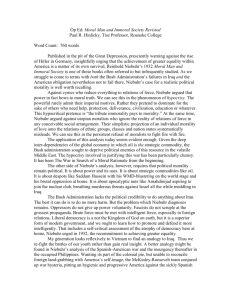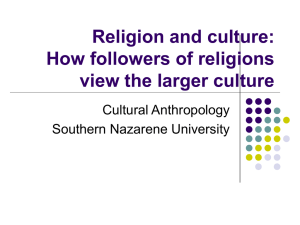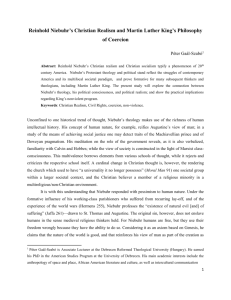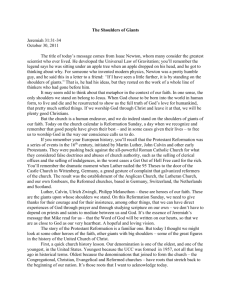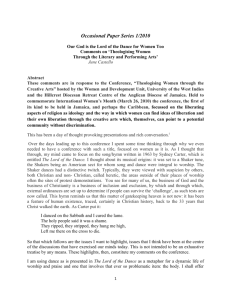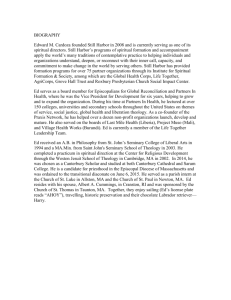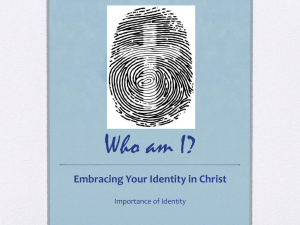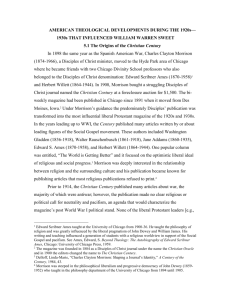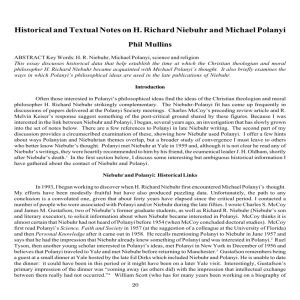Niebuhr | Bio and Theology
advertisement
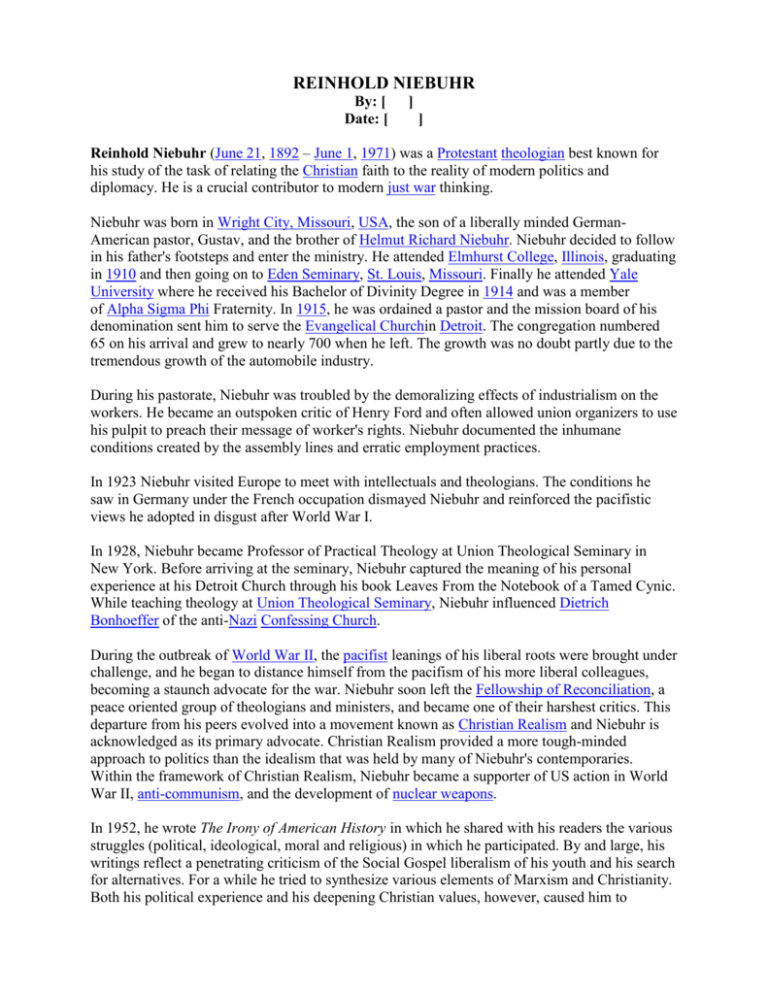
REINHOLD NIEBUHR By: [ Date: [ ] ] Reinhold Niebuhr (June 21, 1892 – June 1, 1971) was a Protestant theologian best known for his study of the task of relating the Christian faith to the reality of modern politics and diplomacy. He is a crucial contributor to modern just war thinking. Niebuhr was born in Wright City, Missouri, USA, the son of a liberally minded GermanAmerican pastor, Gustav, and the brother of Helmut Richard Niebuhr. Niebuhr decided to follow in his father's footsteps and enter the ministry. He attended Elmhurst College, Illinois, graduating in 1910 and then going on to Eden Seminary, St. Louis, Missouri. Finally he attended Yale University where he received his Bachelor of Divinity Degree in 1914 and was a member of Alpha Sigma Phi Fraternity. In 1915, he was ordained a pastor and the mission board of his denomination sent him to serve the Evangelical Churchin Detroit. The congregation numbered 65 on his arrival and grew to nearly 700 when he left. The growth was no doubt partly due to the tremendous growth of the automobile industry. During his pastorate, Niebuhr was troubled by the demoralizing effects of industrialism on the workers. He became an outspoken critic of Henry Ford and often allowed union organizers to use his pulpit to preach their message of worker's rights. Niebuhr documented the inhumane conditions created by the assembly lines and erratic employment practices. In 1923 Niebuhr visited Europe to meet with intellectuals and theologians. The conditions he saw in Germany under the French occupation dismayed Niebuhr and reinforced the pacifistic views he adopted in disgust after World War I. In 1928, Niebuhr became Professor of Practical Theology at Union Theological Seminary in New York. Before arriving at the seminary, Niebuhr captured the meaning of his personal experience at his Detroit Church through his book Leaves From the Notebook of a Tamed Cynic. While teaching theology at Union Theological Seminary, Niebuhr influenced Dietrich Bonhoeffer of the anti-Nazi Confessing Church. During the outbreak of World War II, the pacifist leanings of his liberal roots were brought under challenge, and he began to distance himself from the pacifism of his more liberal colleagues, becoming a staunch advocate for the war. Niebuhr soon left the Fellowship of Reconciliation, a peace oriented group of theologians and ministers, and became one of their harshest critics. This departure from his peers evolved into a movement known as Christian Realism and Niebuhr is acknowledged as its primary advocate. Christian Realism provided a more tough-minded approach to politics than the idealism that was held by many of Niebuhr's contemporaries. Within the framework of Christian Realism, Niebuhr became a supporter of US action in World War II, anti-communism, and the development of nuclear weapons. In 1952, he wrote The Irony of American History in which he shared with his readers the various struggles (political, ideological, moral and religious) in which he participated. By and large, his writings reflect a penetrating criticism of the Social Gospel liberalism of his youth and his search for alternatives. For a while he tried to synthesize various elements of Marxism and Christianity. Both his political experience and his deepening Christian values, however, caused him to 2 abandon the work in favor of an idealogy he called "Christian Realism". These views meshed the Augustinianism of the Reformation with his own hard-won political wisdom. His views were formulated in The Nature and Destiny of Man, a book which is considered the magnum opus and comes as close as he ever came to a systematic presentation of his practical theology. Niebuhr made insightful observations on the human condition, emphasizing its social and political aspects. No other theologian has made such a deep impact upon the social sciences. For over two decades his ideas were the most important influence on theology in American seminaries. The writings of Niebuhr are placed squarely in the middle of a very painful time in the history of the world and of America. Having suffered one World War and a Great Depression, Niebuhr wrote about the injustice of humanity and the need for people to tear down the systems that increased the injustice in the world. In the rise of totalitarian fascism and the horrors of World War II Europe, Niebuhr saw an evil which demanded opposition by force, even by Christians. Taking this lesson further, he wrote concerning the need for a form of democracy that would empower people and rid the world of the human sin of lording power over others. In the beginnings of his work as a vocal social justice proponent, he was a strong democratic socialist. Railing against Franklin Delano Roosevelt’s “New Deal” as being unattainable, after the war he saw his writing as too idealistic and began to fall into line with the “New Deal” and the “Vital Center” of the Democratic party in America. Niebuhr’s work was a great voice within the rising tide of welfare capitalism. Niebuhr was read widely by Christian leaders in the postwar years, most famously by Martin Luther King, Jr., influencing the evolving American postwar national identity. He unintentionally developed in the American psyche a sort of mythological worker of justice in the world—a notion that he stressed was a vision of what might be, not a description of America at the time. Niebuhr saw America as moving in the direction of justice, despite failures such as racial equality and foreign policy in Vietnam. Writing about class equality, he wrote that “We have attained a certain equilibrium in economic society by setting organized power against organized power.” He received the Presidential Medal of Freedom in 1964. Niebuhr is often credited with authorship of the Serenity Prayer used by Alcoholics Anonymous. On this he said: "Of course, it may have been spooking around for years, even centuries, but I don't think so. I honestly do believe that I wrote it myself." Theology Niebuhr's theology was not something thought up in the quiet of an academic environment. Rather, it grew out of his efforts to apply Christianity to the social, economic, and political spheres. For example, the cross of Christ was a particularly important theme for Niebuhr since it revealed the great paradox of powerlessness turned into power, of a love in justice that overcame the sinful world. Indeed, he gave his life to the application of theology in the ethical and political arena. It "focused more on the doctrine of man than on the doctrine of God, and it showed more concern for life in society than for life in the church." As a result, he has been criticized for showing more interest in the paradoxes of human life than in the salvation offered through Christ. 3 In addition, Niebuhr desired that we should see his theology as simply a rediscovery of the lost wisdom of Christian orthodoxy. He compared theology to a painter who, working upon a flat surface, tries to create the illusion of another dimension, depth. The theologian must describe God in the thought forms of our space-time world. But God transcends the world. Theology is an attempt to express the dimension of depth in life. Niebuhr used the term "myth" often. By this he meant that although it deceives, it none the less points to a truth. We must take "myths" seriously, but not literally. For example, the story of Adam and Eve was not historical, rather a mythical statement of the situation on every man and woman. Some commentators believe that Niebuhr did more to introduce Barthian neo-orthodoxy to America than anyone else. While he did reject Barth's overly Christocentric emphasis (because it ignored the basic questions of human society), his adherence to the majority of Barth's views can be seen in the following definitions: GOD THE CREATOR In the Jewish-Christian tradition the problem of pessimism and optimism is solved by faith in a transcendent God who is at once the creator of the world and judge of the world. He thought cognitive knowledge of God impossible because of an alleged dialectic between eternity and time. CREATION We are deceivers yet true, when we say that God created the world. Creation is a mythical idea which cannot be fully rationalized. WRATH OF GOD The wrath of God is the world in its essential structure reacting against the sinful corruption of that structure. MYTH In one sense all Orthodox Christian theology has been guilty of the sin of profanity. It has insisted on the literal and historic truth of its myths, forgetting that it is the function and the character of religious myth to speak of the eternal in relation to time, and that it cannot therefore be a statement of temporal sequences. INCARNATION The significance of Jesus for the religious life of the Western world is due to his attainment and incarnation of a spiritual and moral ideal of such absolute and transcendent nature that none of his followers have been able to compromise it by their practical adjustments to the social necessities of their day. CHRIST'S RESURRECTION Yet honest scholarship must admit that the resurrection is not as well attested as an historical event as the crucifixion. The idea of the resurrection of the body can of course not be literally true. JUSTIFICATION All men who live with any degree of serenity live by some assurance of grace. In every life there must at least be times and seasons when the good is felt as a present possession and not as a far-off goal. The sinner must feel himself "justified", that is, he must feel that his imperfections are understood and sympathetically appreciated as well as challenged. MESSIANIC REIGN As with most biblical symbols dealing with the eternal fulfillment of the course of history, the "end of history" in the messianic reign must not be taken literally. It must nevertheless be taken seriously because it indicates the eternal dimension in which history 4 moves. CHRIST THE JUDGE OF THE WORLD Christ as judge means that when the historical confronts the eternal it is judged by its own ideal possibility, and not by the contrast between the finite and the eternal character of God. CHRIST The God of our devotion is veritably revealed most adequately in the most perfect personality we know, as he is potentially revealed in all personal values; and his conflict with the inertia of the concrete and historical world is expressed most vividly in the cross of Christ. When dealing with life's ultimates, symbolism is indispensable, and a symbolism which has a basis in historic incident is most effective. CHRISTOLOGY Niebuhr thought that doctrines affirming the divinity and humanity of Jesus verge on contradiction in that they ascribe both conditioned and unconditioned qualities to him. Niebuhr thought it possible for a historical person symbolically to point beyond himself to an unconditioned eternity, but considered it impossible for any person to be historical and unconditioned at the same time. Here the importance of one's view of the kenosis is seen. The eternal Son of God remained the unconditioned second person of the Trinity, but he freely chose to limit his freedom from space and time in order to experience life in a given space, time, and culture. Both Barth and Niebuhr held that since Jesus was tempted in all points as we are, He must have had a sinful nature like our fallen nature. SIN AND MAN There are both religious and moral dimensions to sin. The former manifest themselves as rebellion against God. The latter show themselves in man's injustice to his fellow man. To Niebuhr, the great mistake of Liberalism has been its belief that man is essentially good. But, like Barth, he saw the fall as myth and belonging to supra-history rather than history; however, it tells important truths about the human condition. He inveighs against modernists who fail to treat the story of Eden seriously and against fundamentalists who interpret it literally. The Fall conveys the fact that persons stand in the paradoxical relation of freedom and finitude. As spirit, persons transcend nature and so are free. But as creatures, they are part of nature's order and so are bound. For this Niebuhr depended heavily on Soren Kierkegaard's Concept of Dread. As those both free and bound, persons inevitably experience anxiety - the internal precondition for sin. In this state of anxiety Satan tempts persons to deny their limitations through pride or to violate their freedom through sensuality. Niebuhr, like Barth and Brunner, denied that original sin transmits to the race by generation. He said, "Original sin is not an inherited corruption, but it is an inevitable fact of human existence. It is there in every moment of existence, but it has no history". This is the paradox of the Christian faith. Sin does not result from the imperfections of society; it causes them. Finally, Niebuhr claims that the assertion of total depravity is unduly pessimistic. If persons were totally corrupted, they could not be sinners at all. Thus sin has not destroyed essential human nature; the divine image endures despite the reality of sin. "Man has always been his own most vexing problem" CHURCH The Church must learn the truth that secularism has to teach; it must admit that many of the values of our modern culture are due to secular contributions. The major heresy for the Church, be it Catholic or Protestant, is for it to identify itself with God, to suppose that opposition to its way is opposition to God's ways. When the Church is guilty of such pretensions, 5 it needs to be, and usually is, attacked by a secular force. The secular voice becomes a judgment of God upon a Church that has forgotten its true nature. PERIPATOLOGY Niebuhr believed that we should never sit quietly in the midst of an evil situation. RESPONSE Without a historical faith, but a faith in Christian myths, some have wondered why he chose Christian myths over those of the attractive mythologies of the Greeks or Hindus. Niebuhr, more than any other, was able to see the good and bad of the fundamentalist-liberal controversy. He became a mediator between them.
